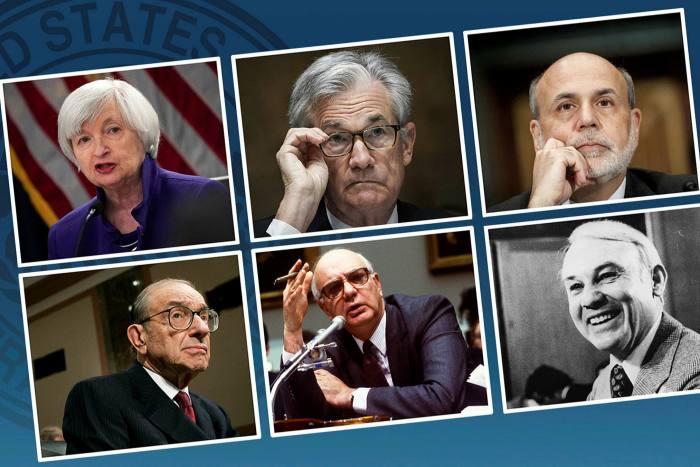World updates
Sign up to myFT Daily Digest to be the first to know about World news.
Good morning. This article is an on-site version of our FirstFT newsletter. Sign up to our Asia, Europe/Africa or Americas edition to get it sent straight to your inbox every weekday morning. You can reach us at firstft@ft.com
Afghans were bracing themselves for life under strict Islamic rule on Monday after the Taliban drove the US-backed government of Ashraf Ghani from power to establish control of Kabul.
Thousands of residents filled the airport and throngs of people tried to push their way on to planes in a desperate effort to flee after the Islamic fighters marched into the capital on Sunday.
The Taliban’s capture of Kabul followed a sweeping offensive that saw the Islamic group overrun most of the country, facing little armed resistance as they encircled the capital.
Analysts said that many Afghan troops had calculated that the fall of the unpopular government was inevitable and opted to surrender peacefully rather than die for an unpopular cause.
The US yesterday increased its deployment to 6,000 troops to support the evacuation of diplomats, allied personnel and thousands of Afghans at risk of retribution for working with the US.
-
The FT View: It was Donald Trump who announced US troops would leave by 2021. But Joe Biden’s decision to go ahead with the pullout was a miscalculation.
-
Opinion: There is now a question mark over whether the US would be willing to go to war with China or Russia, writes Gideon Rachman. The fall of Kabul to the Taliban — 20 years after it was driven out — will end American influence in Afghanistan, probably for decades.
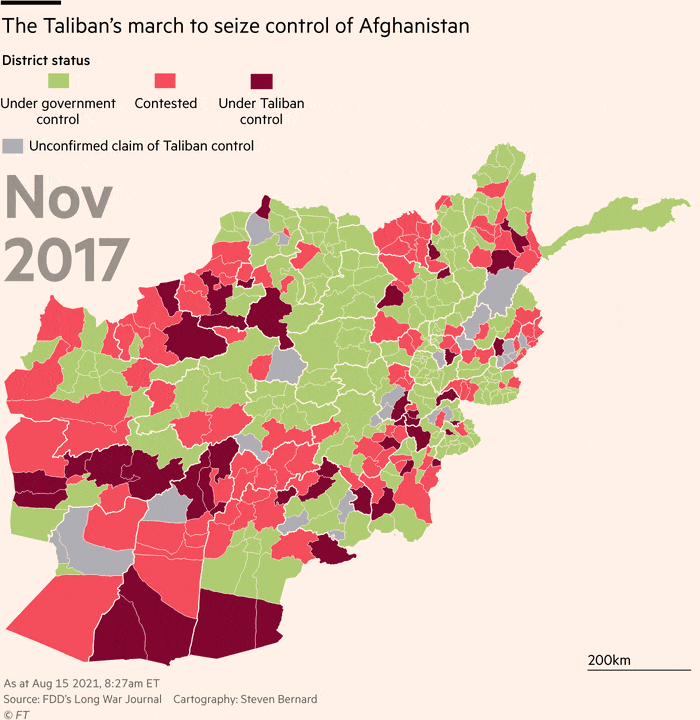
Five more stories in the news
1. Haiti braces for storm after earthquake Rescue workers were trying to treat the injured and reach people trapped under rubble after Saturday’s magnitude 7.2 earthquake and ahead of the arrival of storm Grace, which is expected to make landfall today. Authorities said at least 1,297 people were killed and 5,700 injured by the quake.
2. Shipping bottlenecks set to prolong supply chain turmoil The closure of a terminal at the world’s third-busiest container port is only the latest sign that turmoil in ocean shipping could run into next year, posing a threat to global economic growth as chronic delays and soaring transport costs may leave demand unmet and push up consumer prices.
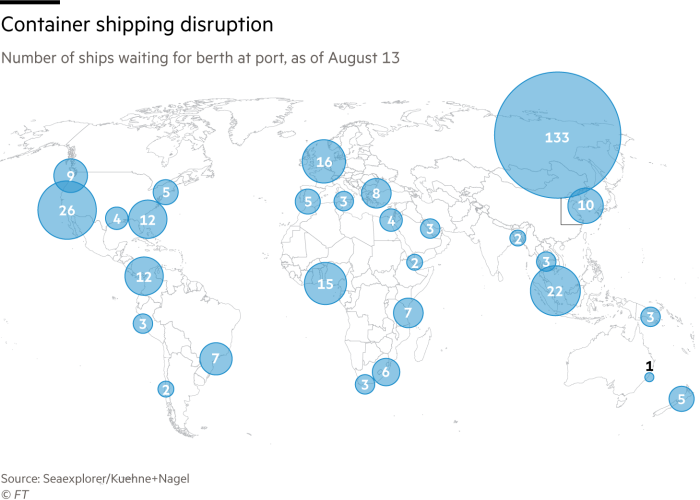
3. HSBC increases Singapore wealth focus with Axa deal The UK-based bank has agreed to buy Axa’s insurance business in Singapore as Europe’s largest lender accelerates its investment in Asia as part of a years-long “pivot” to the region. HSBC said it would pay $575m for the assets.
4. Justin Trudeau calls snap election Canadians will go to the polls on September 20 to vote in a snap election, two years ahead of schedule, after the prime minister called to dissolve the legislature. Trudeau framed the election as a referendum on the government’s pandemic response.
5. US retailer Target defies bricks and mortar doubters While shoppers have deserted shopping centres and department stores during the pandemic, they have flocked to Target’s brightly lit and well organised megastores. Revenues in 2020 leapt 20 per cent to $93.6bn, driven by in-store traffic as well as ecommerce.
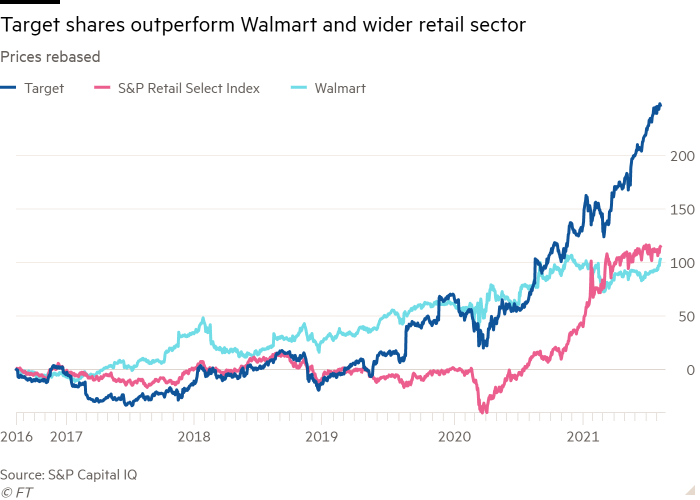
Coronavirus digest
-
China’s economy sharply underperformed in July, with widespread flooding and an outbreak of the coronavirus Delta variant exacerbating concerns that the country’s growth trajectory would continue to lose momentum.
-
The vaccine patents battle intensifies as poor nations struggle in war on coronavirus. The pharmaceutical industry and health officials lock horns over intellectual property waivers for Covid-19 jabs.
-
The US drug regulator has authorised an additional dose of mRNA Covid-19 vaccine for people with weakened immune systems, as officials weigh boosters for at-risk Americans this autumn. Health officials are campaigning to vaccinate more children. (FT, AP)
-
“Only about half” of the nine in 10 UK adults estimated to have Covid-19 antibodies are protected against infection, said Neil Ferguson, a leading epidemiologist.

Follow our live blog for the latest coronavirus news and sign up for our Coronavirus Business Update newsletter.
The day ahead
England self-isolation rule ends From today, double-vaccinated adults and under-18s will not have to self-isolate after coming into close contact with someone who has tested positive for coronavirus. They will be asked to take a PCR test and advised to wear a mask and limit social contact instead.
Belarus ‘Freedom March’ anniversary Belarus will mark one year since more than 200,000 people took to the streets of Minsk to demand elections and protest against regime-inspired violence. Since then, demonstrations have taken place almost every day, opposition leader Sviatlana Tsikhanouskaya writes in the FT.
What else we’re reading
Mexico drug cartels target media in battle for territory Drug cartels — often acting in tandem with crooked cops and public officials — have cowed and killed journalists with impunity, turning Mexico into the most dangerous country for media workers in the hemisphere.
Actually, it doesn’t matter who runs the Fed Along with the pace of tapering, the big question in US monetary policy right now is whether Joe Biden will replace Jay Powell as Fed chair. Edward Price, teacher at NYU’s Center for Global Affairs, argues central bank independence is too theoretical for any appointment to make a difference.
How the US tech giants could fall It is widely forgotten that a decade ago Amazon and Facebook were not in the world’s top 100 companies by market value. On average, companies that reach the top 10 rise by about 75 places over a decade to get there, then fade.
Lunch with the FT: Pfizer chief Albert Bourla The pharma boss sat down with David Crow to discuss the Covid jab, his exchanges with former president Donald Trump and why suspending patents is no way to inoculate the world’s poor.

Poland’s plan to kick its coal habit Warsaw’s plan to go nuclear is an example of the stark choices EU states must face as they adapt to meet the bloc’s ambitious climate goals. For much of the 20th century, Poland’s economy was dependent on coal — making decarbonisation a tough task.
A hedge fund revival? The hedge fund industry acquitted itself well in the market turmoil of 2020, returning 11.8 per cent last year — the best year since the aftermath of the financial crisis in 2009. But some leading investors still believe many funds do not justify their high fees.
‘I am crying inside a lot’: Myanmar’s man at the UN This month, Myanmar’s UN representative received a tip-off from one of his New York-based countrymen, who was acting as a volunteer bodyguard: there was a plot against his life. But Kyaw Moe Tun is already back at work.
Business Book of the Year 2021 As the world faces the pandemic and climate emergency, this year’s longlist for the Financial Times and McKinsey Business Book of the Year Award features titles that promise to offer routes away from impending disaster.
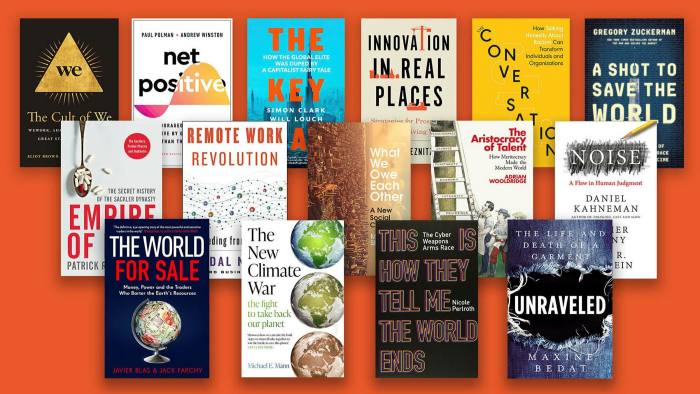
Work & Careers
It is not cutting-edge to suggest that staff who have agency over their working practices will feel better disposed towards an organisation. What is disturbing is that ordinary asks, such as flexible working and menopause support policies, become buzz topics, writes Viv Groskop.
-
Behind closed doors: While Andrew Hill argues that leaders must stop blaming their bad management on remote workers, some staffers have doubled their salaries during the pandemic on the sly with two jobs. (FT, WSJ)
Recommended newsletters for you
Due Diligence — Top stories from the world of corporate finance. Sign up here
Moral Money — Our unmissable newsletter on socially responsible business, sustainable finance and more. Sign up here


